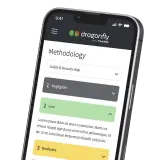Should you develop a mobile application or a web application? This is a common question yet it seems to us like a lot of businesses out there are opting for the mobile app route by default without fully considering the benefits and trade-offs of the alternative. Here is a rough breakdown of the tradeoffs:
The pro's and the cons
Device-native applications
Device native apps are the kind you find within the apple app store or on Google play. These apps 'live' on the device itself.
| Pro's | Cons |
|---|---|
| Distibutable via the app store (if appropriate to your app). | Requires you to go through Apples approval process. |
| You can make the most of a devices hardware such as GPS and bluetooth. | If you want your app to work on more than one device type then you may need to develop it again just for that platform. |
| You get an application that sits on the users device. | If you want to update your application quickly across all users then it can be tricky to ensure everyone has the latest version. |
| Very good for gaming as it can use the phone's processor and graphics chips. | More time consuming programatically to use data and resources from a central web server. |
| There is a risk that platform updates render your app useless and force additional development time to be needed. |
Mobile web applications
Web apps 'live' on the internet, are accessible via a web browser and do not need to be installed via the app store to be used.
| Pro's | Cons |
|---|---|
| The best way to ensure your site or application works on the most possible devices and platforms (including desktop PC's) | There may be restrictions to using device hardware such as bluetooth or GPS. |
| Generally cheaper to develop than your native app alternative. | You lose the ability to deliver the application through the app store |
| You only need to develop it once for all devices | Offline working (though possible) may have restrictions. (though technically so can an app) |
| If you update your code base then it updates for all devices. | A slow internet connection can make it difficult to use. |
| It is quicker and easier to integrate your web application with your website. | |
| Ability to integrate the web application with other online tools such as google analytics |
In summary
Out of the above we consider the biggest benefits of a device-native application is that you can distribute it via the app stores and can utilise the devices hardware and memory. As a result offline apps and games that run without an internet connection become feasible.
The biggest benefit of a web application is that any device that has a web browser can access them, distribution doesn't need to go through any app stores (with complex and tight approval processes) and software updates can happen immediately and across all users of the system. If your application requires a constant internet connection and you are looking to deploy it across your organisation you may well find that a web application makes the most sense for this reason.
Considering market research
We think that developing web applications and websites for mobile devices is a must have. The market is growing and not taking advantage of it could result in your business being left to the dust by your competiton.
Don't just take our word for it, have a look at your own website analytics. It is highly likely that you will see a trend towards mobile visitors increasing. While some of our sites only generate 10-20% of it's visitors from mobile, some have as many as 50-70%! Demographic is key so don't forget to check it. Don't know how to find out this information? Why not ask us about it?
If you are considering implementing a mobile strategy and can't decide which route to go then please get in touch., also you may be interested in our white paper on mobile responsive websites:




